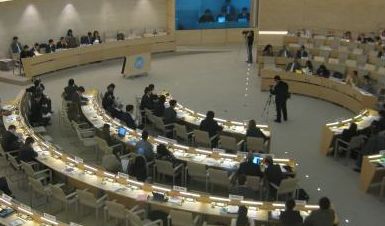
Joint Statement on the UPR process – Human Rights Council – 25th session
Oral statement Item 6 – General Debate
21 March 2014
UPR Info – Joint statement
Thank you Mr. President,
This statement is made on behalf of 19 organisations. We welcome the statement read earlier by Uruguay on behalf of 58 States on the role of NGOs at the UPR.
While the universality of the UPR is undeniable, we call for a qualitative leap with regard to the precision of recommendations. We are indeed concerned that without a specific action contained in a recommendation, it is hard for a State under Review to understand what is required from it. It also makes it difficult to assess, four years later, the level of implementation of the recommendation. We therefore welcome the commitment made earlier by Morocco together with 46 States “to always give high quality recommendations to other states, by ensuring that all our recommendations are precise, practical, constructive, forward looking and implementable. “
When the UPR started, critics said recommendations lacked specificity. Nonetheless, over the first cycle a great amount of efforts was made and the quality actually improved. According to UPR Info’s data, the percentage of specific recommendations rose from 31% at the two first UPR sessions to 39 % at the two last sessions of the first cycle.
However, Mr President, this positive trend has slowed down at the 2nd cycle, despite regular commitments by States. The average of specific recommendations during the first four sessions of the second cycle is 31% again.
We therefore call upon States to make more specific and action-oriented recommendations. States should use all resources at hand to reach this aim, notably by meeting with NGOs to find out what actions are really needed on the ground to improve the human rights situation. Additionally, we encourage States to use the information from the treaty bodies, which offer quality and precise recommendations.
In this regard, we would like to underline the importance of the resolution voted by the General Assembly on the treaty body strengthening process. More meeting weeks per year will result in a greater number of concluding observations. We believe that those concluding observations would benefit the UPR process and help the trend return to its positive dynamic of the 1st cycle.
I thank you.
List of signatories:
ARTICLE 19
Cairo Institute for Human Rights Studies
CIVICUS: World Alliance for Citizen Participation
Franciscans International
FIACAT
FIDH – Fédération internationale des ligues des droits de l’homme Human Rights Watch
IIMA – Istituto Internazionale Maria Ausiliatrice
International Lesbian and Gay Association
IMADR
International Publishers Association
International Service for Human Rights
Minority Rights Group (MRG)
Pax Romana
PEN International
Reporters Without Borders
Save the Children
VIDES International